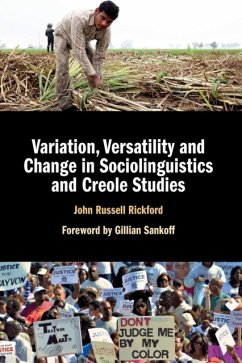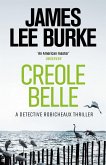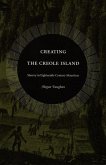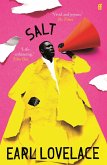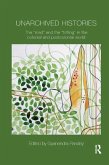John Russell Rickford (California Stanford University)
Variation, Versatility and Change in Sociolinguistics and Creole Studies
John Russell Rickford (California Stanford University)
Variation, Versatility and Change in Sociolinguistics and Creole Studies
- Broschiertes Buch
- Merkliste
- Auf die Merkliste
- Bewerten Bewerten
- Teilen
- Produkt teilen
- Produkterinnerung
- Produkterinnerung
A collection of seminal articles that show how linguists who study variation and change in language and society, and those who study pidgin and creole languages, have benefitted from sharing their respective data, theories and methods. Ideal for scholars and students of sociolinguistics, creole studies, and Caribbean and African American studies.
Andere Kunden interessierten sich auch für
![Creole Genesis and the Acquisition of Grammar Creole Genesis and the Acquisition of Grammar]() Claire Lefebvre (Montreal Universite du Quebec)Creole Genesis and the Acquisition of Grammar62,99 €
Claire Lefebvre (Montreal Universite du Quebec)Creole Genesis and the Acquisition of Grammar62,99 €![Babel Babel]() R.F. KuangBabel17,99 €
R.F. KuangBabel17,99 €![Creole Belle Creole Belle]() James Lee Burke (Author)Creole Belle17,99 €
James Lee Burke (Author)Creole Belle17,99 €![Creating the Creole Island Creating the Creole Island]() Megan VaughanCreating the Creole Island42,99 €
Megan VaughanCreating the Creole Island42,99 €![Salt Salt]() Earl LovelaceSalt17,99 €
Earl LovelaceSalt17,99 €![Unarchived Histories Unarchived Histories]() Unarchived Histories65,99 €
Unarchived Histories65,99 €![A Comprehensive and Comparative Grammar of English Creoles A Comprehensive and Comparative Grammar of English Creoles]() Anand SyeaA Comprehensive and Comparative Grammar of English Creoles42,99 €
Anand SyeaA Comprehensive and Comparative Grammar of English Creoles42,99 €-
-
-
A collection of seminal articles that show how linguists who study variation and change in language and society, and those who study pidgin and creole languages, have benefitted from sharing their respective data, theories and methods. Ideal for scholars and students of sociolinguistics, creole studies, and Caribbean and African American studies.
Hinweis: Dieser Artikel kann nur an eine deutsche Lieferadresse ausgeliefert werden.
Hinweis: Dieser Artikel kann nur an eine deutsche Lieferadresse ausgeliefert werden.
Produktdetails
- Produktdetails
- Verlag: Cambridge University Press
- Seitenzahl: 388
- Erscheinungstermin: 11. März 2021
- Englisch
- Abmessung: 229mm x 152mm x 20mm
- Gewicht: 570g
- ISBN-13: 9781107450554
- ISBN-10: 1107450551
- Artikelnr.: 60713307
- Herstellerkennzeichnung
- Libri GmbH
- Europaallee 1
- 36244 Bad Hersfeld
- gpsr@libri.de
- Verlag: Cambridge University Press
- Seitenzahl: 388
- Erscheinungstermin: 11. März 2021
- Englisch
- Abmessung: 229mm x 152mm x 20mm
- Gewicht: 570g
- ISBN-13: 9781107450554
- ISBN-10: 1107450551
- Artikelnr.: 60713307
- Herstellerkennzeichnung
- Libri GmbH
- Europaallee 1
- 36244 Bad Hersfeld
- gpsr@libri.de
John Russell Rickford is J. E. Wallace Sterling Professor of Humanities and Linguistics at Stanford University, California. Author of over 100 articles and author/editor of fourteen books in Linguistics, John won the American Book Award in 2000 for Spoken Soul (2000), co-authored with his son Russell, and the 'Best Paper in Language Award, 2016' for a paper (co-authored with Sharese King and included in this volume) on the 2013 trial of George Zimmerman for the murder of Trayvon Martin.
Foreword Gillian Sankoff; Acknowledgements; Introduction; 1.
Sociolinguistic fieldwork in a racial and political maelstrom: getting in,
getting on, and primary recording instruments and techniques; 2. Symbol of
powerlessness and degeneracy? Or symbol of solidarity and truth?
Paradoxical attitudes towards pidgins and creoles with Elizabeth Closs
Traugott; 3. 'Me Tarzan, you Jane!': cognition, expression and the creole
speaker; 4. The haves and have nots: sociolinguistic surveys and the
assessment of speaker competence; 5. Connections between sociolinguistics
and pidgin-creole studies; 6. Implicational scales; 7. Variation and the
versatility approach to language arts in schools and societies with Angela
E. Rickford; 8. Le Page's theoretical and applied legacy in
sociolinguistics and creole studies; 9. The social and the linguistic in
sociolinguistic variation: Mii en noo (me ain' know); 10. A variationist
approach to subject-aux question inversion in Bajan and other Caribbean
creole Englishes, AAVE and Appalachian with Robin Melnick; 11. Situation:
stylistic variation in sociolinguistic corpora and theory; 12. Language and
linguistic on trial: hearing Rachel Jeantel (and other vernacular speakers)
in the courtroom and beyond with Sharese King; 13 The continuing need for
new approaches to social class analysis in sociolinguistics; 14. Concord
and conflict in the speech community; 15. The joy of sociolinguistic
fieldwork.
Sociolinguistic fieldwork in a racial and political maelstrom: getting in,
getting on, and primary recording instruments and techniques; 2. Symbol of
powerlessness and degeneracy? Or symbol of solidarity and truth?
Paradoxical attitudes towards pidgins and creoles with Elizabeth Closs
Traugott; 3. 'Me Tarzan, you Jane!': cognition, expression and the creole
speaker; 4. The haves and have nots: sociolinguistic surveys and the
assessment of speaker competence; 5. Connections between sociolinguistics
and pidgin-creole studies; 6. Implicational scales; 7. Variation and the
versatility approach to language arts in schools and societies with Angela
E. Rickford; 8. Le Page's theoretical and applied legacy in
sociolinguistics and creole studies; 9. The social and the linguistic in
sociolinguistic variation: Mii en noo (me ain' know); 10. A variationist
approach to subject-aux question inversion in Bajan and other Caribbean
creole Englishes, AAVE and Appalachian with Robin Melnick; 11. Situation:
stylistic variation in sociolinguistic corpora and theory; 12. Language and
linguistic on trial: hearing Rachel Jeantel (and other vernacular speakers)
in the courtroom and beyond with Sharese King; 13 The continuing need for
new approaches to social class analysis in sociolinguistics; 14. Concord
and conflict in the speech community; 15. The joy of sociolinguistic
fieldwork.
Foreword Gillian Sankoff; Acknowledgements; Introduction; 1.
Sociolinguistic fieldwork in a racial and political maelstrom: getting in,
getting on, and primary recording instruments and techniques; 2. Symbol of
powerlessness and degeneracy? Or symbol of solidarity and truth?
Paradoxical attitudes towards pidgins and creoles with Elizabeth Closs
Traugott; 3. 'Me Tarzan, you Jane!': cognition, expression and the creole
speaker; 4. The haves and have nots: sociolinguistic surveys and the
assessment of speaker competence; 5. Connections between sociolinguistics
and pidgin-creole studies; 6. Implicational scales; 7. Variation and the
versatility approach to language arts in schools and societies with Angela
E. Rickford; 8. Le Page's theoretical and applied legacy in
sociolinguistics and creole studies; 9. The social and the linguistic in
sociolinguistic variation: Mii en noo (me ain' know); 10. A variationist
approach to subject-aux question inversion in Bajan and other Caribbean
creole Englishes, AAVE and Appalachian with Robin Melnick; 11. Situation:
stylistic variation in sociolinguistic corpora and theory; 12. Language and
linguistic on trial: hearing Rachel Jeantel (and other vernacular speakers)
in the courtroom and beyond with Sharese King; 13 The continuing need for
new approaches to social class analysis in sociolinguistics; 14. Concord
and conflict in the speech community; 15. The joy of sociolinguistic
fieldwork.
Sociolinguistic fieldwork in a racial and political maelstrom: getting in,
getting on, and primary recording instruments and techniques; 2. Symbol of
powerlessness and degeneracy? Or symbol of solidarity and truth?
Paradoxical attitudes towards pidgins and creoles with Elizabeth Closs
Traugott; 3. 'Me Tarzan, you Jane!': cognition, expression and the creole
speaker; 4. The haves and have nots: sociolinguistic surveys and the
assessment of speaker competence; 5. Connections between sociolinguistics
and pidgin-creole studies; 6. Implicational scales; 7. Variation and the
versatility approach to language arts in schools and societies with Angela
E. Rickford; 8. Le Page's theoretical and applied legacy in
sociolinguistics and creole studies; 9. The social and the linguistic in
sociolinguistic variation: Mii en noo (me ain' know); 10. A variationist
approach to subject-aux question inversion in Bajan and other Caribbean
creole Englishes, AAVE and Appalachian with Robin Melnick; 11. Situation:
stylistic variation in sociolinguistic corpora and theory; 12. Language and
linguistic on trial: hearing Rachel Jeantel (and other vernacular speakers)
in the courtroom and beyond with Sharese King; 13 The continuing need for
new approaches to social class analysis in sociolinguistics; 14. Concord
and conflict in the speech community; 15. The joy of sociolinguistic
fieldwork.

